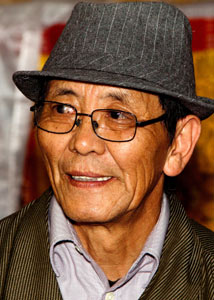Name: Dhundup Tsering
(Alias: No)
Gender: Male
Interview Age: 65
Date of Birth: 1948
Birthplace: Tsona, Utsang, Tibet
Year Left Tibet: 1963
Profession: Farming, Nomad
Monk/Nun: No
Political Prisoner: No

Interview No.: 5C
Date: 2013-05-03
Language: Tibetan
Location: Richmond, California, United States
Categories: Culture and History
Keywords: Buddhist beliefs, childhood memories, children's games, customs/traditions, education, refugee in India -- life as, Tibetan Government-in-exile, Utsang
Summary:
Dhundup Tsering describes Tsona, his birthplace as a large town with about 1,000 families. His family earned their livelihood from farming, rearing animals and trade. He describes the different games he played as a child. He states that his family annually moved to Arunachal Pradesh, India during wintertime when it became too cold in Tsona and spent 5-6 months in Mon Tawang in the summertime.
Dhundup Tsering's family heard about the escape of His Holiness the Dalai Lama into India in 1959 and decided not to return to Tibet from Mon Tawang that summer. Dhundup Tsering talks about attending his first school at the age of 13 at the Transit School in Dharamsala, India and then the Tibetan School in Mussoorie. After finishing school his first job was the construction of the Library of Tibetan Works and Archives in Dharamsala. Subsequently he served as assistant accountant and assistant secretary for the Library and then the Handicraft Center, serving the Tibetan Government-in-exile for 20 years.
Dhundup Tsering believes that Tibetan culture is unique in the way it is interrelated to Buddhist dharma. For him the most important teaching is "If you cannot help someone, do not cause harm." He also explains the Dalai Lama's advice that by "cultivating relations, gradually there will be a change of heart" between the Chinese and Tibetans.
Interview Team:
- Marcella Adamski (Interviewer)
- Jeddadiah Emanuel (Videographer)
- Tenzin Tsedup Wangdu (Interpreter)

